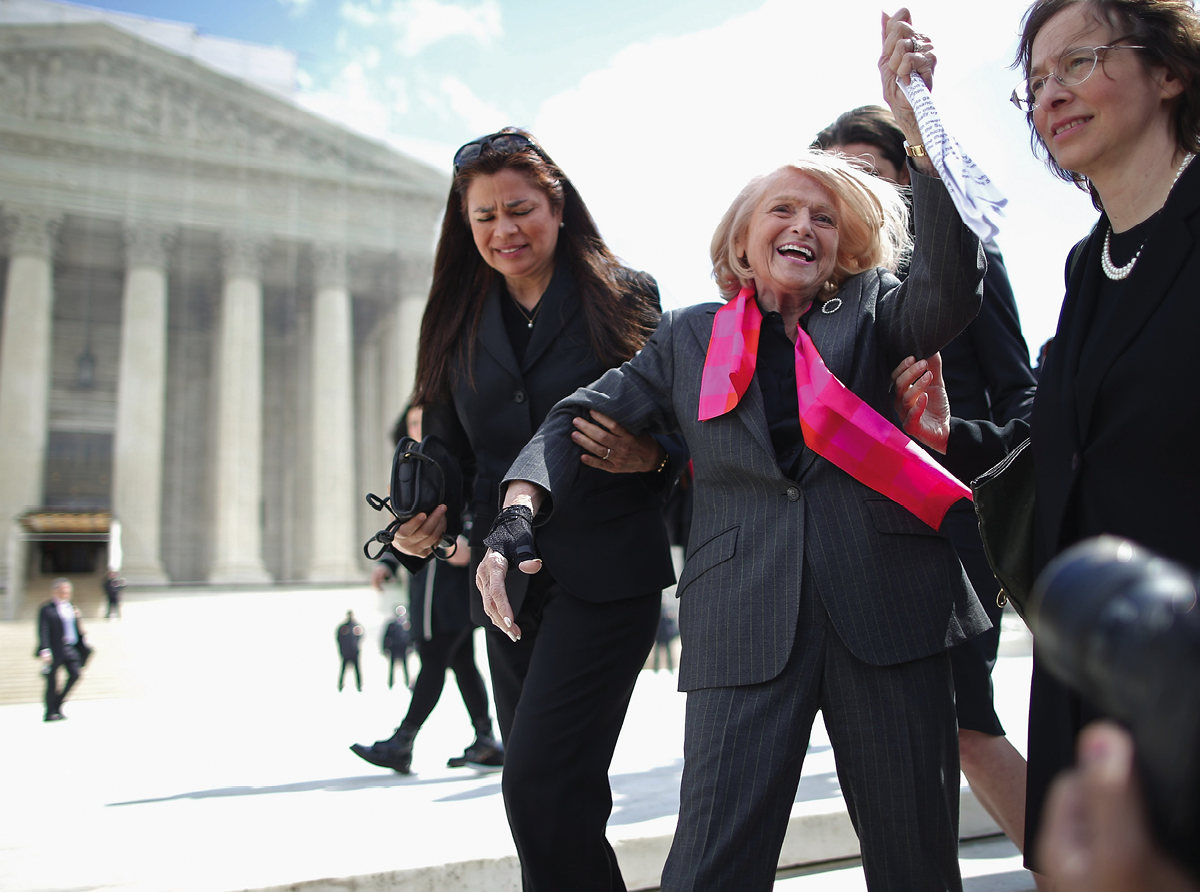The Supreme Court invalidated part of the federal Defense of Marriage Act. What does that tell us about challenges to state laws that ban same-sex marriage?
By Suzanna Sherry
Herman O. Loewenstein Professor of Law

Edith Windsor was legally married to Thea Spyer under New York law. When Spyer died, however, Windsor was not entitled to claim the marital exemption from federal estate taxes. Why not? Because § 3 of the federal Defense of Marriage Act—DOMA—provided that for purposes of all federal laws, including the tax code, “the word ‘marriage’ means only a legal union between one man and one woman.” For tax purposes, Windsor and Spyer were never married despite the fact that their marriage was recognized as valid by the state in which they lived.
Windsor challenged the constitutionality of DOMA’s § 3, and the Supreme Court ultimately agreed with her. By a 5–4 vote, the Court held that part of DOMA unconstitutional as a violation of the Fifth Amendment to the U.S. Constitution.

The dissenting Justices and some commentators have criticized Justice Kennedy’s majority opinion as incoherent. They have charged that it is vague and rambling, and that it mashes together concerns about liberty, concerns about equality, and concerns about federalism. They complain that it fails to specify the level of scrutiny that should be applied to laws that discriminate on the basis of sexual orientation.
But in fact, Justice Kennedy’s opinion makes perfect sense.
First: It is black-letter law—and has been for 200 years—that a law is valid only if it is rationally related to some legitimate government purpose. The government, in other words, cannot act arbitrarily. With regard to the federal government, this requirement finds a home both in the Due Process Clause of the Fifth Amendment and in what has come to be known as the Equal Protection component of the Fifth Amendment (which incorporates and is thus equivalent to the Equal Protection Clause of the 14th Amendment, extending that clause to the federal government as well as the states). The Due Process Clause focuses on liberty, and the Equal Protection component on equality, but both encompass the core insight that the government may not enact arbitrary or irrational laws.
Second: Prejudice, animus, or a mere desire to stigmatize some people or make them second-class citizens is not a legitimate governmental purpose. This, too, is black-letter law, and explains everything from why racially segregated schools are unconstitutional (Brown v. Board of Education), to why it was unconstitutional for Colorado to prohibit the citizens of Denver from protecting gays against discrimination (Romer v. Evans), to why it was unconstitutional for Texas to prohibit certain sexual conduct by persons of the same sex (Lawrence v. Texas).
Third: In light of the fact that Congress has always before let state law decide who is married for purposes of federal law, and has never previously enacted any law governing marriage, the only conclusion to be drawn from DOMA’s unprecedented intrusion on state authority over marriage is that it was enacted out of prejudice, animus, and a desire to stigmatize couples in same-sex marriages. (The Court also had other evidence that bolstered this conclusion that DOMA’s purpose and effect were to “demean those persons who are in lawful same-sex marriages.”)
Thus, the majority opinion was neither rambling nor insufficiently focused. The opinion examined the history of state and federal regulation of marriage not because DOMA raised a federalism issue—as critics of the decision charge—but because that history provides evidence of DOMA’s illegitimate purpose. And the opinion discussed both liberty and equality because DOMA’s lack of a legitimate governmental purpose runs afoul of both the Due Process Clause and the Equal Protection component. It is a denial of the liberty of one class of persons, based solely on prejudice against them. The historical regulation of marriage by states rather than the federal government, the infringement of liberty, and lack of equal treatment are all part of the single argument that DOMA is unconstitutional because it lacks a legitimate governmental purpose.
“…the five Justices in the majority are likely to be skeptical of claims that state bans on same-sex marriage are based on a legitimate governmental purpose.”
Nor is the opinion deficient in its failure to specify the level of scrutiny that should be directed at laws like DOMA. The test applied by the majority in Windsor—a rational relationship to a legitimate governmental purpose—is the lowest level of scrutiny. Any law that fails that test will necessarily fail every other level of scrutiny as well. The majority did not define the level of scrutiny because it did not need to: The level of scrutiny made no difference to the outcome. Indeed, had the Court specified a level of scrutiny, there probably would have been cries of “dicta!” and complaints that the Court had gone beyond its role of deciding specific disputes.
If Windsor makes perfect sense, what does it bode for the future? It suggests that the five Justices in the majority are likely to be skeptical of claims that state bans on same-sex marriage are based on a legitimate governmental purpose. Instead, those Justices are likely to conclude that such bans are motivated solely by prejudice and animus, that the laws deliberately brand one group with the stigma of inferiority and attempt to make pariahs out of law-abiding citizens. That is what § 3 of DOMA did, and that is why the majority found it unconstitutional. The same majority is likely to draw the same conclusion regarding state bans on same-sex marriage.